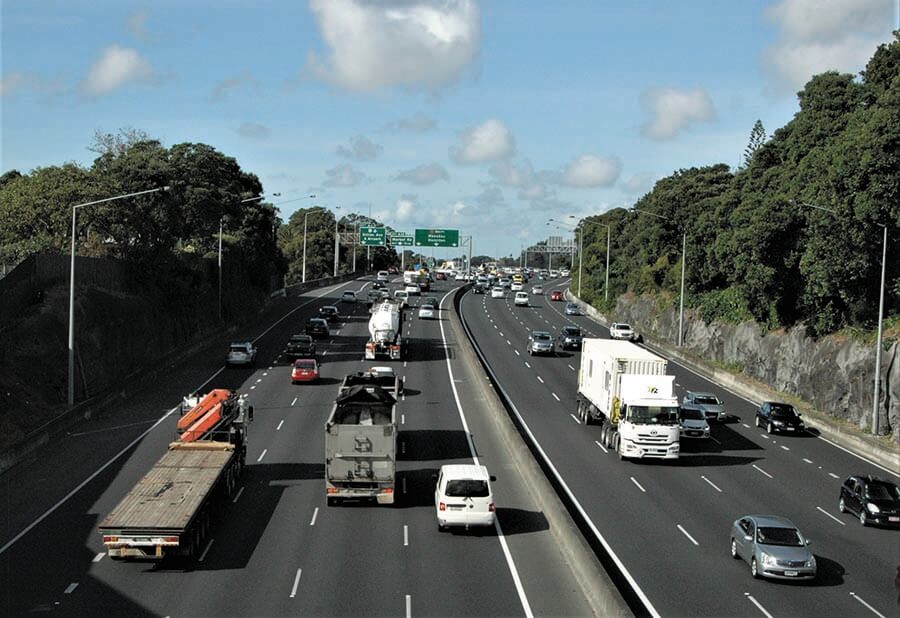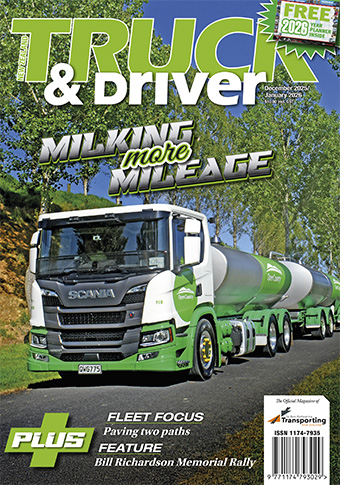Ia Ara Aotearoa Transporting New Zealand News


Balance of power shifting in the economy
Firstly, let me say how excited I am by the rebranding of the Road Transport Forum into Ia Ara Aotearoa Transporting New Zealand.
Replacing the tired RTF brand with Ia Ara Aotearoa Transporting New Zealand is about conveying what the industry does for the public and business in NZ – transporting their goods, to their door, when they need them; or their food, medicines and other essentials to the stores they shop at, so it is always there when they want it.
You can read more about our new brand on Page 43 – as well as how it fits with where I see that the country needs to head to overcome this pandemic.
Taking a look at other recent events that will impact our industry, I am delighted with the recent passing of the Fair Trading Amendment Bill into law. A lot of hard work went into this behind the scenes, starting with former RTF CEO Ken Shirley, who successfully lobbied then Small Business Minister Stuart Nash to look into the practice of unilateral deferred payments that were becoming an issue for smaller operators in our industry.
...Firstly, let me say how excited I am by the rebranding of the Road Transport Forum into Ia Ara Aotearoa Transporting New Zealand.
Replacing the tired RTF brand with Ia Ara Aotearoa Transporting New Zealand is about conveying what the industry does for the public and business in NZ – transporting their goods, to their door, when they need them; or their food, medicines and other essentials to the stores they shop at, so it is always there when they want it.
You can read more about our new brand on Page 43 – as well as how it fits with where I see that the country needs to head to overcome this pandemic.
Taking a look at other recent events that will impact our industry, I am delighted with the recent passing of the Fair Trading Amendment Bill into law. A lot of hard work went into this behind the scenes, starting with former RTF CEO Ken Shirley, who successfully lobbied then Small Business Minister Stuart Nash to look into the practice of unilateral deferred payments that were becoming an issue for smaller operators in our industry.
Transporters working for big players in the primary sector were forced to accept 60-90-day payment terms. If they didn’t, they would lose the business – and that threatened their livelihoods. Terms such as these have a major impact on many small NZ businesses, including those that make up a chunk of road freight transport.
Typically, small businesses are not flush with cash and it is therefore critical that they are paid for their services within a reasonable timeframe. We lobbied for extending the provisions of the Fair Trading Act as a simple solution for dealing with this.
We had argued for a contract threshold of $500,000 because in our industry, despite being small businesses themselves, many operators take on large contracts. Unfortunately, we didn’t win that one, but we feel we have won the war.
The Bill targets the use of pressure tactics, deception, one-sided contract terms and practices that exploit the vulnerabilities of a consumer or small business. It adds to the existing protections put in place under the Fair Trading Act 1986 by:
• Prohibiting unconscionable conduct in trade.
• Extending unfair contract term protections to include small trade contracts worth $250,000 a year or less.
• Legally empowering consumers and businesses to demand uninvited sellers, such as door-to-door salespeople, to leave their property, including through the use of ‘do not knock’ stickers.
• Businesses that are found to act unconscionably – using practices that go beyond what can be deemed commercially necessary – will face fines of up to $600,000.
Looking at the overall state of the economy at the moment, one of the biggest issues on the horizon is the growing rate of inflation and the associated increases in living costs. This is not good news, and many who weren’t around in the 1970s and 1980s, when inflation rates peaked above 12%, have no experience in dealing with this economic hit, particularly in an overheated property market.
We’re a long way from those bad old days, but in the second quarter of this year the annual inflation rate hit 3.3%, up from 1.5% in the first quarter – the highest annual rate since 2011. Economists predict this is just the beginning, as the real costs of heavy government spending will be seen in rising inflation.
This comes during the time of COVID, which has also hit the supply chain significantly, with high demand and low supply. With our indefinitely-closed border, the return of lockdowns, our small size as an international market, and our distant location from any other market, NZ will not fare well in the next couple of years when it comes to getting goods in and out of the country. Exports were already down 25% in the first quarter of this year.
The silver lining of knowing what is coming, in a time of much uncertainty otherwise, is we can prepare in advance…as best we can. Now is the time to make sure your business practices and structures are positioned to ride the wave.
In the road freight transport industry, the balance of power is shifting. Where many operators have been at the beck and call of customers who continue to drive prices and conditions down to the frankly unreasonable and unsustainable, it’s time for smart operators to rethink those relationships.
When the supply side is constrained, longterm relationships matter, and the reality is those who continually undercut others won’t survive the rapidly increasing cost of doing business.
We have seen the worst of the uneven balance of power in the release of the Commerce Commission’s draft report into competition in the retail grocery sector. It found that the duopoly of Woolworths NZ and Foodstuffs, without real competition, is able to exercise its buying power to push excess risks, costs and uncertainty onto suppliers. That can ruin small businesses. It’s the supermarkets’ way or the highway, and transport operators have been caught up in that.
I am hoping this report will lead to suppliers having more power, especially when you consider they’re the ones who have kept the country running smoothly over the period since COVID-19 first reared its head in NZ.
Some of the real heroes of the pandemic have been the farmers, growers, labourers, truck drivers, logistics workers etc, who ensured that the food, medicines and other essentials got to those who needed them. The supermarkets were praised for staying open and allowing everyone to buy the essentials, but in reality they were just the last piece in the puzzle, and often the ones who enforced harsh terms and conditions on their suppliers.
COVID-19 and the lockdowns are causing ongoing issues with limited supply of people and equipment, and I’ve heard that some established carriers can’t fulfil some of their longterm contracts. This presents the opportunity for operators to use their own networks and technology to improve efficiency. This might be worth exploring as an industry.
There is always opportunity if you know where to look for it, as many who have been in the road freight transport business a long time will be aware. In the longterm, the rocky road ahead may, in fact, provide a better path to a sustainable business for many transport operators.



 + EQUIPMENT GUIDE - FREE
+ EQUIPMENT GUIDE - FREE
